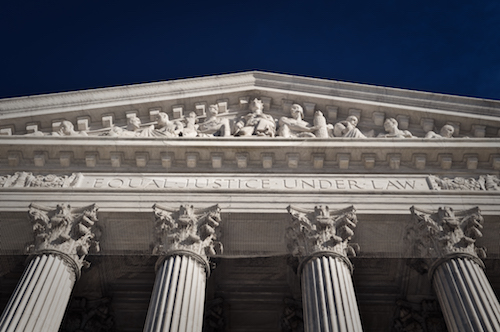“Once resolved, copyright owners will know what is required before being able to sue…”
 On Thursday, June 28, the U.S. Supreme Court agreed to hear a case that should resolve the long-standing question of whether a plaintiff must have a copyright registration in hand when filing suit or, instead, can merely have an application pending. The case is Fourth Estate Public Benefit Corp. v. Wall-Street.com LLC, 17-571.
On Thursday, June 28, the U.S. Supreme Court agreed to hear a case that should resolve the long-standing question of whether a plaintiff must have a copyright registration in hand when filing suit or, instead, can merely have an application pending. The case is Fourth Estate Public Benefit Corp. v. Wall-Street.com LLC, 17-571.
Section 411(a) of the Copyright Act states that:
no civil action for infringement of the copyright in any United States work shall be instituted until preregistration or registration of the copyright claim has been made in accordance with this title. In any case, however, where the deposit, application, and fee required for registration have been delivered to the Copyright Office in proper form and registration has been refused, the applicant is entitled to institute a civil action for infringement if notice thereof, with a copy of the complaint, is served on the Register of Copyrights.
Some circuits interpreted this language to require a plaintiff to have an issued copyright certificate or have the Copyright Office reject the plaintiff’s application (the so-called “registration” approach). The Eleventh Circuit, from which the Fourth Estate case arises, follows the registration approach. The Tenth Circuit also follows the registration approach. Obtaining a copyright registration can take months unless the applicant pays a nonrefundable $800 fee for expedited handling when there is “compelling need,” such as prospective litigation.
Other circuits, including the Ninth and Fifth Circuits, follow the “application approach.” This approach holds that there is no requirement to filing and maintaining an infringement action other than having completed and filed an application. These courts view the registration as a formality that will result in either a registration or rejection of the application, either of which will allow the litigant to proceed.
The Solicitor General filed a brief in favor of the court taking the case. That brief urges the high court to adopt the “registration” approach based on the plain language of the statute.
Once resolved, copyright owners will know what is required before being able to sue and in addition, venue shopping for one approach or the other will be terminated. The Supreme Court’s decision should provide much-needed clarity and uniformity in copyright litigation moving forward.
Image Source: Deposit Photos.

![[IPWatchdog Logo]](https://ipwatchdog.com/wp-content/themes/IPWatchdog%20-%202023/assets/images/temp/logo-small@2x.png)

![[Advertisement]](https://ipwatchdog.com/wp-content/uploads/2024/04/Patent-Litigation-Masters-2024-sidebar-early-bird-ends-Apr-21-last-chance-700x500-1.jpg)

![[Advertisement]](https://ipwatchdog.com/wp-content/uploads/2021/12/WEBINAR-336-x-280-px.png)
![[Advertisement]](https://ipwatchdog.com/wp-content/uploads/2021/12/2021-Patent-Practice-on-Demand-recorded-Feb-2021-336-x-280.jpg)
![[Advertisement]](https://ipwatchdog.com/wp-content/uploads/2021/12/Ad-4-The-Invent-Patent-System™.png)







Join the Discussion
One comment so far.
Mark Pope
June 29, 2018 11:19 am“preregistration or registration of the copyright claim has been made”
so what does preregistration mean if not filing an application?